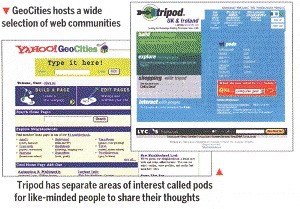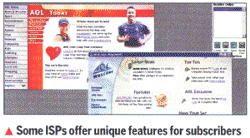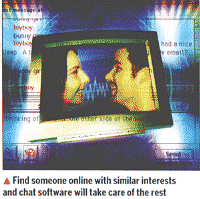 ONLINE COMMUNITIES
ONLINE COMMUNITIES
 ONLINE COMMUNITIES
ONLINE COMMUNITIES
![]()
The internet is a great place to meet diverse and interesting people from all over the world. Just simply log on and get acquainted
Have something to share with others but your friends and family won't listen? Want to expand your social life and meet people with the same interests? All you need to do is log on and discover the hidden delights of web communities. The internet is often referred to as a global village. But the casual surfer could be forgiven for thinking it's a village made up of a long high street crowded with shops. What about the village inn or the community centre? Where do people go to exchange information and gossip, or to pour their hearts out to their mates? In fact, there are many types of community online, and all you need to start using them is your web browser. A web community can take many different forms, and each has its own distinct character. If you don't feel at home in the first one you find, hunt around and you're sure to find another that takes your fancy. There are communities based solely on the web, those that use email, some which rely on using special software, and some that are a mixture. A community could simply be a loose association of websites with a common theme, allowing you to jump from one person's site to another. Or it could be a dedicated site with profiles of regular visitors, a live chat room or a message board where you can join in a themed discussion.
 Life in the city
Life in the city
You'd be forgiven for thinking that web communities are made up of people
who can't make friends in the real world, but are often much more than that.
There can be lots of benefits - from keeping in touch with friends and family
to finding support, or simply meeting people with common interests. One of
the longest established web communities is Geocities. Most people think of
Geocities as simply a place where you can get free web space, but it's much
more than that. To start with, it's divided into neighbourhoods, with a selection
of themes. If you're artistic, for instance, you might want to look through
the SoHo section, while MotorCity is home to car fans. You'll find people
in neighbourhoods with similar interests, which you can read about on their
web pages. Or perhaps you could send them an email. If you want to talk to
more than one person at a time, Geocities also provides forums and chat rooms.
Forums are like noticeboards you send a message and it stays online for other
people to read and respond to. For example, you might post a message asking
if anyone can recommend a good place to get your car serviced or what people
think of a new CD, and wait for the response. Chat rooms, on the other hand,
are 'live'. Type a line of text into your computer, and everyone viewing
the site will see it on their screen at the same time. Tripod, another free
web space provider, has a similar system with areas of interest called pods,
which group together home pages, chat rooms and forums. Unlike Geocities,
you don't have to decide which community you want to put your site in right
away. You can create your pages and then join a pod - or more than
one.
Beyond borders
If you visit most net communities, you'll find that they're breaking down
barriers all over the place. While Tripod may have separate front pages for
the UK, Germany and other countries, users are by no means separated from
each other. Join a pod, or a neighbourhood on Geocities. and you'll find
people from all over the world. Online communities aren't just social either.
You can meet useful people professionally through online communities - people
who will let you draw on their expertise or help you out when you need a
new contact. Communities can bring together people for campaigning, for help
with computer problems or just about any other reason why people might get
together in real life.
 More than the web
More than the web
For many people, web pages, chat rooms and message forums are the easiest
way to get involved, but ISPs like AOL and CompuServe provide their own
communities, with chat rooms and forums that are accessible only to subscribers.
You'll often find, since you have to use special software to access them,
that they have unique features. AOL, for example, lets you block messages
from someone who's annoying you, or receive an automatic notification when
someone in your Buddy List' signs on. You don't always have to sign up to
a new ISP to get these kinds of features. Another popular way to communicate
with people is called ICQ
(www.icq.com). This is a small program
that you can set up to run each time you connect to the internet, and where
you can enter a list of contacts. The program will let you know when your
contacts are online, and you can send them a private message, or they can
invite you to join them in a chat room.
Getting started
The ICQ program can offer a great way of starting your own community,
in fact. When you first install the program you're given a unique ICQ number
which you can put on your web pages for people to contact. There's also a
searchable directory, so you could list your interests or search for people
who might have something in common with you.
FREE COMMUNITIES ONLINE |
|
| Geocities | www.geocities.com |
| ICQ | www.icq.com |
| Listbot | www.listbot.com |
| OneList | www.onelist.com |
| Tripod | www.tripod.co.uk |
| WebRing | www.webring.org |
| Yahoo | www.yahoo.com |
Join a web ring
What if you want to build up a community through a web page? Well, you
don't need to move all your pages to somewhere like Geocities or Tripod to
join a community. One alternative is to join a web ring. A web ring is simply
a group of websites, with each having a link to the next and the previous
in the ring. The idea is that you can start at the first site and when you've
read it click the 'next site' link to see another similar one. Visit a site
like www.webring.org to sign up to create
a new web ring or join an existing one. After that you just need to add a
little bit of software from the web ring site to your pages and, hey presto
you have buttons for next site previous site and often one for a random site
in the ring. When someone wants to join you must update a master list on
the web ring site and they're automatically part of it - people already in
the ring don't have to update their pages in make it all work If you want
to build a community around a certain theme, the best place to start is probably
with a website of your own. All you need to do is create a web ring, ask
other people to link to it and sign up to ICQ so that people can chat to
you when you're online. Whether you decide to sign up to a community orientated
site like Geocities or Tripod, or go it alone with your own web ring, you'll
soon find that web communities can be a rewarding activity on the internet.
Email communities
The web is one way to make friends, but it's not the only way. And sometimes
you don't want to have to spend time online reading messages while the phone
bill clocks up. Email communities called mailing lists - are much older thin
the web, and millions of people around the world use them. The best thing
about email is that you don't have to go somewhere special online to read
the messages. Instead, they come straight to your mailbox so you can collect
them quickly, then hang up the phone arid read them at your leisure. Many
mailing lists also have an associated web page, with features like archives
of old messages that you can search through. If you want to create your own
email community, just visit one of the sites that offers them like OneList
or Listbot, and fill in a few forms People can join by clicking on a link
or sending a message to a special address. So don't just sit there reading
websites - take the plunge. Join a community or start one of your own. You'll
soon find that the most important resource on the internet isn't libraries,or
shops, or animation-packed web pages. It's people.